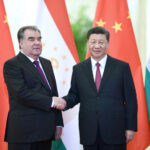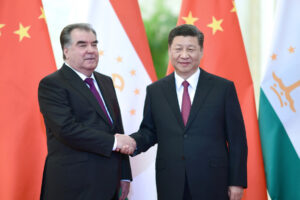Super Garuda Shield, annual joint drills led by the Indonesian and U.S. militaries, kicked off in Indonesia’s East Java province on Thursday, drawing more participating countries amid escalating tensions in the South China Sea.
Six countries are sending troops to Super Garuda Shield 2023: Indonesia, the U.S., Japan, Australia, Singapore and the United Kingdom. Nine others are attending as observers, according to the Indonesian Armed Forces (TNI): the Philippines, Brunei, East Timor, Papua New Guinea, New Zealand, South Korea, Canada, France and Germany.
The figures represent an increase from last year, when five countries sent troops and eight others attended as observers. TNI said nearly 5,000 troops are participating in the two-week joint exercises through Sept. 13, mostly from Indonesia and the U.S.
The joint drills are hosted annually by Indonesia and date back to 2007. They used to involve only the Indonesian and U.S. armies, and were called Garuda Shield, but were expanded last year to involve troops from different military branches and other countries, mostly U.S. allies in the Indo-Pacific — thus the name change.
“Super Garuda Shield 2023 builds on last year’s tremendous success,” Gen. Charles Flynn, the commanding general of U.S. Army Pacific, said in a written statement on Tuesday. “This joint, multinational training exercise displays our collective commitment and like-minded unity, allowing for a stable, secure, and more peaceful, free and open Indo-Pacific.”
Japan said its Amphibious Rapid Deployment Brigade, a unit established in 2018 that is similar to the U.S. Marine Corps, is taking part in this year’s Super Garuda Shield. Japan joined the drills for the first time last year, taking part in an airborne training exercise.
The expanding drills reflect escalating tensions in the South China Sea, where China is growing more assertive with its unilateral claim over waters also claimed by several Southeast Asian nations. Standoffs involving Indonesian and Chinese vessels have been on the rise in waters off Indonesia’s Natuna Islands on the southern edge of the disputed sea. China has claimed the Indonesian exclusive economic zone in the area as part of its traditional fishing grounds.
Jakarta, however, has been careful to avoid the ire of Beijing due to its increasing reliance on China as a trade partner and source of direct foreign investment. The choice to hold this year’s drills far from the remote Natuna Islands may be a reflection of caution by Indonesia.
The current drills are being held in the East Java cities of Surabaya and Banyuwangi. Last year, some of the drills were conducted on the island of Singkep, which has direct access to Natuna.
This year’s drills include more professional training and combat exercises. The U.S. Embassy said the training includes expert academic exchanges and professional development workshops, a command and control simulation, an amphibious exercise, airborne operations, an airfield seizure exercise and “a combined joint field training that culminates with a live fire event.”
The command-post exercise will focus on planning missions in a combined military setting. “A field training exercise will involve battalion-strength elements from each nation exercising war-fighting skills to enhance interoperability and combined operational capacity,” the embassy added.
Muhamad Haripin, a defense analyst at Indonesia’s National Research and Innovation Agency, said the more varied exercises and country participants should help improve the capacities of the Indonesian military.
“I think East Java is chosen … to allow the [military] personnel to learn different kinds of field” situations, Haripin told Nikkei Asia.
He added that Beijing might not pay much attention to the locations of the exercises, focusing instead on “strategic collaborations in the aspect of interoperability between the TNI and the U.S. Armed Forces, which are getting more intensive and regular.”
Haripin also cited the signing of a memorandum of understanding last week between Indonesia’s Defense Ministry and U.S. aircraft manufacturer Boeing for the purchase of 24 F-15EX fighter jets.
Indonesian Defense Minister Prabowo Subianto and U.S. Defense Secretary Lloyd Austin said in a joint statement after the signing that the two countries “reaffirmed that our defense partnership is stronger than ever.”
The statement also highlights that Indonesia and the U.S. “hold more than 220 defense engagements annually, from subject-matter expert exchanges to multilateral exercises with thousands of troops, all demonstrating the breadth of our interoperability.”















